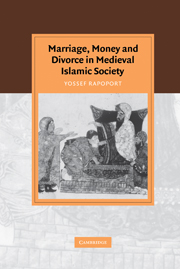Book contents
- Frontmatter
- Contents
- Acknowledgments
- Glossary
- List of abbreviations
- Introduction
- Chapter 1 Marriage, divorce and the gender division of property
- Chapter 2 Working women, single women and the rise of the female ribāṭ
- Chapter 3 The monetization of marriage
- Chapter 4 Divorce, repudiation and settlement
- Chapter 5 Repudiation and public power
- Conclusion
- Bibliography
- Index
- Cambridge Studies in Islamic Civilization
Introduction
Published online by Cambridge University Press: 15 June 2009
- Frontmatter
- Contents
- Acknowledgments
- Glossary
- List of abbreviations
- Introduction
- Chapter 1 Marriage, divorce and the gender division of property
- Chapter 2 Working women, single women and the rise of the female ribāṭ
- Chapter 3 The monetization of marriage
- Chapter 4 Divorce, repudiation and settlement
- Chapter 5 Repudiation and public power
- Conclusion
- Bibliography
- Index
- Cambridge Studies in Islamic Civilization
Summary
Shihāb al-Dīn Aḥmad Ibn Ṭawq, a notary in late fifteenth-century Damascus, liked to keep a detailed record of his transactions and other memorable events. This is what he wrote in his diary on Ṣafar 19, 890 (March 7, 1485):
Monday the 19th. In the last few days the weather was very windy. The gusts broke in half an almond tree in the garden, one of the big ones. The tree fell on a heavy pear tree and trimmed its upper half. Many trees were lost. Let us seek refuge in Allāh from the wickedness of our souls and our evil deeds.
I divorced my wife at her request, by mutual consent, after being accused of repudiating her and for doing things and not doing others. The witnesses were Ibn Nūr al-Dīn al-Khaṭṭābī and his colleague Ibn al-Dayrī. She became unlawful to me.
In the afternoon we witnessed the remarriage of Yūsuf ibn Khālid and his divorcee, the manumitted slave-girl of Amat Sulṭān, in the Mosque of Manjak. The marriage gift was 10 Ashrafī gold coins, which remain a due debt upon the groom. The witnesses were the writer of these lines and Ibn Nūr al-Dīn al-Khaṭṭābī. Shaykh Muhannā presided, and Ibn al-Dayrī accepted the marriage on behalf of the groom.
Divorce was pervasive in late medieval Damascus. As a notary, Ibn Ṭawq made his living out of witnessing the divorce deeds and the subsequent marriages of other Damascene couples, many of which he then recorded in his diary.
- Type
- Chapter
- Information
- Publisher: Cambridge University PressPrint publication year: 2005

